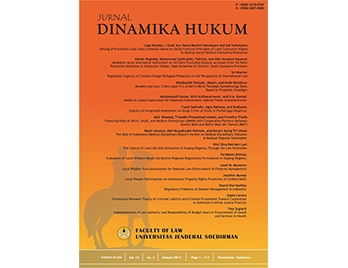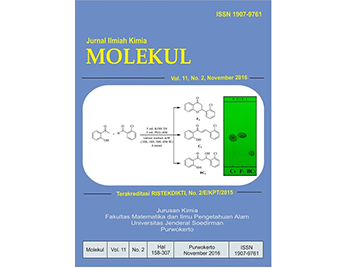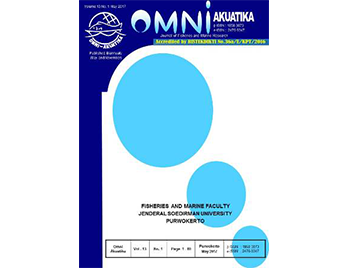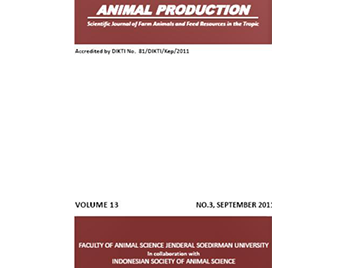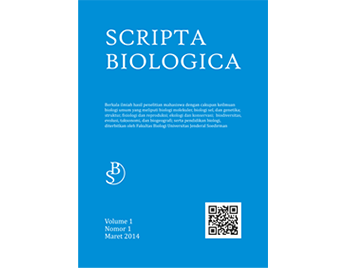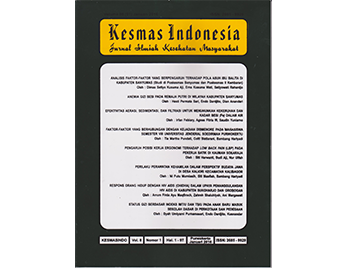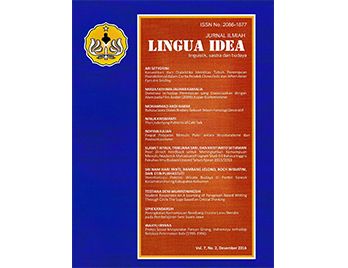##plugins.pubIds.doi.readerDisplayName##
https://doi.org/10.20884/1.ppmi.2023.7.1.9272
Referensi
Ansell, C., & Gash, A. (2008). Collaborative governance in theory and practice. Journal of Public Administration Research and Theory, 18(4), 543–571.
Battour, & Ismail, N. . (2016). Halal tourism: concepts, practises, challenges and future, tourism management perspectives. Tourism Management Perspectives, 19, 150–154.
Benussi, M. (2021). Pietaskscapes of halal living: subjectivity, striving, and space-making in Muslim Russia. Ethnic and Racial Studies, 44(10), 1821–1843. https://doi.org/10.1080/01419870.2020.1856904
Berryman, D. R. (2019). Medical Reference Services Quarterly Ontology, Epistemology, Methodology, and Methods: Information for Librarian Researchers. Taylor & Francis, 38(3), 271–279. https://www.tandfonline.com/action/journalInformation?journalCode=wmrs20
Bueno, K. A., Santos, C. A., Ozkan, S., & Irigoyen-García, J. (2014). An Islamic past in contemporary Spanish and Portuguese tourism narratives. Tourism, Culture and Communication, 13(3), 191–202. https://doi.org/10.3727/109830414X13935097526596
Desky, H., Thaver, B., & Rijal, S. (2022). Analysis of Tourist Satisfaction with Halal Tourism in Aceh. Indonesian Journal of Halal Research, 4(1), 1–8. https://doi.org/10.15575/ijhar.v4i1.14479
Faza, M. A. (2019). Analisis SWOT Pariwisata Halal Provinsi Nusa Tenggara Barat. Jurnal Manajemen Indonesia, 19(1), 10–29. www.wonderfullomboksumbawa.com.
Fitriana, W. D. (2019). Digitalisasi Kuliner Dan Wisata Halal Daerah Jombang Melalui Aplikasi “Jombang Halal Tourism.” Dinar : Jurnal Ekonomi Dan Keuangan Islam, 5(2). https://doi.org/10.21107/dinar.v5i2.5004
Garit Bira Widhasti Herning Suryo Sardjono, C. D. (2017). Diplomasi Publik Pemerintah Republik Indonesia. Ejurnal.Unisri.Ac.Id, 1, 7–8. http://ejurnal.unisri.ac.id/index.php/sldrts/article/view/1956
GMTI. (2021). Global Muslim Travel Index 2021. In Mastercard-CrescentRating (Issue July). https://www.crescentrating.com/reports/global-muslim-travel-index-2021.html
Han, H., Al-Ansi, A., Olya, H. G. T., & Kim, W. (2019). Exploring halal-friendly destination attributes in South Korea: Perceptions and behaviors of Muslim travelers toward a non-Muslim destination. Tourism Management, 71, 151–164. https://doi.org/10.1016/j.tourman.2018.10.010
Hong, M., Sun, S., Beg, A. B. M. R., & Zhou, Z. (2019). Determinants of halal purchasing behaviour: evidences from China. Journal of Islamic Marketing, 10(2), 410–425. https://doi.org/10.1108/JIMA-03-2018-0053
Innes, J. E., & Booher, D. E. (2018). Planning with complexity: An introduction to collaborative rationality for public policy. In Planning with Complexity: An Introduction to Collaborative Rationality for Public Policy. New York: Routledge. https://doi.org/10.4324/9781315147949
Jaelani, A. (2017). International Review of Management and Marketing Halal Tourism Industry in Indonesia: Potential and Prospects. International Review of Management and Marketing, 7(3), 25–34. http:www.econjournals.com
Jamal, T., & Budke, C. (2020). Tourism in a world with pandemics: local-global responsibility and action. Journal of Tourism Futures, 6(2), 181–188. https://doi.org/10.1108/JTF-02-2020-0014
Jeaheng, Y., Al-Ansi, A., & Han, H. (2019). Halal-friendly hotels: impact of halal-friendly attributes on guest purchase behaviors in the Thailand hotel industry. Journal of Travel and Tourism Marketing, 36(6), 729–746. https://doi.org/10.1080/10548408.2019.1631940
Jumaidin, J. (2022). Implementasi Atraksi Wisata Halal Pasca Pandemi Covid-19. Journal of Islamic Tourism, Halal Food, Islamic Traveling, and Creative Economy, 2(2), 158–175. https://doi.org/10.21274/ar-rehla.v2i2.5903
Kusumaningtyas, M., & Lestari, S. (2020). Model Pengembangan Makanan Dan Pariwisata Halal Di Indonesia. Media Mahardhika, 19(1), 44–49. https://doi.org/10.29062/mahardika.v19i1.195
Marlinda, A. P., Al-Fadhat, F., Cipto, B., & Jubba, H. (2022). Halal tourism as a strategic option for South Korean tourism. Journal of Islamic Marketing. https://doi.org/10.1108/JIMA-03-2021-0074
Mohsin, A., Ramli, N., & Alkhulayfi, B. A. (2016). Halal tourism: Emerging opportunities. Tourism Management Perspectives, 19, 137–143. https://doi.org/10.1016/j.tmp.2015.12.010
Muin, F. (2015). Otonomi Daerah Dalam Persepektif Pembagian Urusan Pemerintah-Pemerintah Daerah Dan Keuangan Daerah. FIAT JUSTISIA:Jurnal Ilmu Hukum, 8(1). https://doi.org/10.25041/fiatjustisia.v8no1.288
Mulyani, S., Ahsani, R. D. P., & Wijaya, D. N. (2021). Collaborative Governance on Ecotourism: Towards Sustainable Tourism Development. Jurnal Borneo Administrator, 17(3), 319–334. https://doi.org/10.24258/jba.v17i3.958
Musyafah, A. A., Prananda, R. R., Sarono, A., & Setyowati, R. (2020). Pengembangan Pariwisata Halal Dalam Rangka Mewujudkan Indonesia Sebagai Pusat Pariwisata Halal Dunia. Basic Themes Toward Halal Sustainability Management, September, 44. https://www.researchgate.net/profile/Nurdeng-Deuraseh/publication/344260365_BASIC_THEMES_TOWARD_HALAL_SUSTAINABILITY_MANAGEMENT_IN_BRUNEI_DARUSSALAM_AND_INDONESIA_Editor_Ro’fah_Setyowati_Nurdeng_Deuraseh_Nor_Surilawana_Sulaiman/links/5f616f47a6fdcc1164159
Nabatchi, T., & Emerson, K. (n.d.). Implementation in collaboration governance. In Handbook of collaborative public management (pp. 402-420). Edward Elgar Publishing.
Ningsih, D. S., Astuti, R. S., & Priyadi, B. P. (2022). Prospects of Halal Tourism Development in West Aceh District. Jurnal Public Policy, 8(2), 96. https://doi.org/10.35308/jpp.v8i2.4569
Nisa, F. L. (2022). PENGEMBANGAN WISATA HALAL DI JAWA TIMUR DENGAN KONSEP SMART TOURISM. Journal of Islamic Tourism, Halal Food, Islamic Traveling, and Creative Economy, 2(1), 13–26. https://doi.org/10.21274/ar-rehla.v2i1.5470
Putri, E. A. (2021). Kewenangan MUI Pasca Terbitnya PP No. 31 Tahun 2019 Tentang Peraturan Pelaksanaan UU No. 33 Tahun 2014 Tentang Jaminan Produk Halal. Krtha Bhayangkara, 15(2), 333–350. https://doi.org/10.31599/krtha.v15i2.792
Rasul, T. (2019). The trends, opportunities and challenges of halal tourism: a systematic literature review. Tourism Recreation Research, 44(4), 434–450. https://doi.org/10.1080/02508281.2019.1599532
Rhama, B. (2022). The halal tourism – alternative or mass tourism? Indications of traditional mass tourism on crescent rating guidelines on halal tourism. Journal of Islamic Marketing, 13(7), 1492–1514. https://doi.org/10.1108/JIMA-07-2020-0199
ROZALINDA, R., NURHASNAH, N., & RAMADHAN, S. (2019). Industri Wisata Halal Di Sumatera Barat: Potensi, Peluang Dan Tantangan. Maqdis : Jurnal Kajian Ekonomi Islam, 4(1), 45. https://doi.org/10.15548/maqdis.v4i1.210
Saleh, R., & Anisah, N. (2018). Pariwisata Halal di Aceh : Gagasan dan Realitas di Lapangan. Sahafa Journal of Islamic Communication, 1(2), 79. https://doi.org/10.21111/sjic.v1i2.2849
Sukri, I. F. (2021). Implementasi Undang-Undang Cipta Kerja Terhadap Penyelenggaraan Sertifikasi Halal Dan Produk Halal Di Indonesia. Majalah Hukum Nasional, 51(1), 73–94. https://doi.org/10.33331/mhn.v51i1.139
Uansaard, S., & Binprathan, A. (2018). Creating the awareness of halal MICE tourism business in Chiang Mai, Thailand. International Journal of Tourism Policy, 8(3), 203–213. https://doi.org/10.1504/IJTP.2018.094490
Vargas-Sánchez, A., & Moral-Moral, M. (2019). Halal tourism: literature review and experts’ view. J11(3),. Journal of Islamic Marketing, 549-569.
Vargas-Sánchez, A., & Moral-Moral, M. (2019). Halal tourism: state of the art. Tourism Review, 74(3), 385–399. https://doi.org/10.1108/TR-01-2018-0015
Wildemuth, B. M. (Ed. ). (2016). Applications of social research methods to questions in information and library science. Abc-Clio.
Yusof, S. M., & Shutto, N. (2014). The Development of Halal Food Market in Japan: An Exploratory Study. Procedia - Social and Behavioral Sciences, 121, 253–261. https://doi.org/10.1016/j.sbspro.2014.01.1126
Battour, & Ismail, N. . (2016). Halal tourism: concepts, practises, challenges and future, tourism management perspectives. Tourism Management Perspectives, 19, 150–154.
Benussi, M. (2021). Pietaskscapes of halal living: subjectivity, striving, and space-making in Muslim Russia. Ethnic and Racial Studies, 44(10), 1821–1843. https://doi.org/10.1080/01419870.2020.1856904
Berryman, D. R. (2019). Medical Reference Services Quarterly Ontology, Epistemology, Methodology, and Methods: Information for Librarian Researchers. Taylor & Francis, 38(3), 271–279. https://www.tandfonline.com/action/journalInformation?journalCode=wmrs20
Bueno, K. A., Santos, C. A., Ozkan, S., & Irigoyen-García, J. (2014). An Islamic past in contemporary Spanish and Portuguese tourism narratives. Tourism, Culture and Communication, 13(3), 191–202. https://doi.org/10.3727/109830414X13935097526596
Desky, H., Thaver, B., & Rijal, S. (2022). Analysis of Tourist Satisfaction with Halal Tourism in Aceh. Indonesian Journal of Halal Research, 4(1), 1–8. https://doi.org/10.15575/ijhar.v4i1.14479
Faza, M. A. (2019). Analisis SWOT Pariwisata Halal Provinsi Nusa Tenggara Barat. Jurnal Manajemen Indonesia, 19(1), 10–29. www.wonderfullomboksumbawa.com.
Fitriana, W. D. (2019). Digitalisasi Kuliner Dan Wisata Halal Daerah Jombang Melalui Aplikasi “Jombang Halal Tourism.” Dinar : Jurnal Ekonomi Dan Keuangan Islam, 5(2). https://doi.org/10.21107/dinar.v5i2.5004
Garit Bira Widhasti Herning Suryo Sardjono, C. D. (2017). Diplomasi Publik Pemerintah Republik Indonesia. Ejurnal.Unisri.Ac.Id, 1, 7–8. http://ejurnal.unisri.ac.id/index.php/sldrts/article/view/1956
GMTI. (2021). Global Muslim Travel Index 2021. In Mastercard-CrescentRating (Issue July). https://www.crescentrating.com/reports/global-muslim-travel-index-2021.html
Han, H., Al-Ansi, A., Olya, H. G. T., & Kim, W. (2019). Exploring halal-friendly destination attributes in South Korea: Perceptions and behaviors of Muslim travelers toward a non-Muslim destination. Tourism Management, 71, 151–164. https://doi.org/10.1016/j.tourman.2018.10.010
Hong, M., Sun, S., Beg, A. B. M. R., & Zhou, Z. (2019). Determinants of halal purchasing behaviour: evidences from China. Journal of Islamic Marketing, 10(2), 410–425. https://doi.org/10.1108/JIMA-03-2018-0053
Innes, J. E., & Booher, D. E. (2018). Planning with complexity: An introduction to collaborative rationality for public policy. In Planning with Complexity: An Introduction to Collaborative Rationality for Public Policy. New York: Routledge. https://doi.org/10.4324/9781315147949
Jaelani, A. (2017). International Review of Management and Marketing Halal Tourism Industry in Indonesia: Potential and Prospects. International Review of Management and Marketing, 7(3), 25–34. http:www.econjournals.com
Jamal, T., & Budke, C. (2020). Tourism in a world with pandemics: local-global responsibility and action. Journal of Tourism Futures, 6(2), 181–188. https://doi.org/10.1108/JTF-02-2020-0014
Jeaheng, Y., Al-Ansi, A., & Han, H. (2019). Halal-friendly hotels: impact of halal-friendly attributes on guest purchase behaviors in the Thailand hotel industry. Journal of Travel and Tourism Marketing, 36(6), 729–746. https://doi.org/10.1080/10548408.2019.1631940
Jumaidin, J. (2022). Implementasi Atraksi Wisata Halal Pasca Pandemi Covid-19. Journal of Islamic Tourism, Halal Food, Islamic Traveling, and Creative Economy, 2(2), 158–175. https://doi.org/10.21274/ar-rehla.v2i2.5903
Kusumaningtyas, M., & Lestari, S. (2020). Model Pengembangan Makanan Dan Pariwisata Halal Di Indonesia. Media Mahardhika, 19(1), 44–49. https://doi.org/10.29062/mahardika.v19i1.195
Marlinda, A. P., Al-Fadhat, F., Cipto, B., & Jubba, H. (2022). Halal tourism as a strategic option for South Korean tourism. Journal of Islamic Marketing. https://doi.org/10.1108/JIMA-03-2021-0074
Mohsin, A., Ramli, N., & Alkhulayfi, B. A. (2016). Halal tourism: Emerging opportunities. Tourism Management Perspectives, 19, 137–143. https://doi.org/10.1016/j.tmp.2015.12.010
Muin, F. (2015). Otonomi Daerah Dalam Persepektif Pembagian Urusan Pemerintah-Pemerintah Daerah Dan Keuangan Daerah. FIAT JUSTISIA:Jurnal Ilmu Hukum, 8(1). https://doi.org/10.25041/fiatjustisia.v8no1.288
Mulyani, S., Ahsani, R. D. P., & Wijaya, D. N. (2021). Collaborative Governance on Ecotourism: Towards Sustainable Tourism Development. Jurnal Borneo Administrator, 17(3), 319–334. https://doi.org/10.24258/jba.v17i3.958
Musyafah, A. A., Prananda, R. R., Sarono, A., & Setyowati, R. (2020). Pengembangan Pariwisata Halal Dalam Rangka Mewujudkan Indonesia Sebagai Pusat Pariwisata Halal Dunia. Basic Themes Toward Halal Sustainability Management, September, 44. https://www.researchgate.net/profile/Nurdeng-Deuraseh/publication/344260365_BASIC_THEMES_TOWARD_HALAL_SUSTAINABILITY_MANAGEMENT_IN_BRUNEI_DARUSSALAM_AND_INDONESIA_Editor_Ro’fah_Setyowati_Nurdeng_Deuraseh_Nor_Surilawana_Sulaiman/links/5f616f47a6fdcc1164159
Nabatchi, T., & Emerson, K. (n.d.). Implementation in collaboration governance. In Handbook of collaborative public management (pp. 402-420). Edward Elgar Publishing.
Ningsih, D. S., Astuti, R. S., & Priyadi, B. P. (2022). Prospects of Halal Tourism Development in West Aceh District. Jurnal Public Policy, 8(2), 96. https://doi.org/10.35308/jpp.v8i2.4569
Nisa, F. L. (2022). PENGEMBANGAN WISATA HALAL DI JAWA TIMUR DENGAN KONSEP SMART TOURISM. Journal of Islamic Tourism, Halal Food, Islamic Traveling, and Creative Economy, 2(1), 13–26. https://doi.org/10.21274/ar-rehla.v2i1.5470
Putri, E. A. (2021). Kewenangan MUI Pasca Terbitnya PP No. 31 Tahun 2019 Tentang Peraturan Pelaksanaan UU No. 33 Tahun 2014 Tentang Jaminan Produk Halal. Krtha Bhayangkara, 15(2), 333–350. https://doi.org/10.31599/krtha.v15i2.792
Rasul, T. (2019). The trends, opportunities and challenges of halal tourism: a systematic literature review. Tourism Recreation Research, 44(4), 434–450. https://doi.org/10.1080/02508281.2019.1599532
Rhama, B. (2022). The halal tourism – alternative or mass tourism? Indications of traditional mass tourism on crescent rating guidelines on halal tourism. Journal of Islamic Marketing, 13(7), 1492–1514. https://doi.org/10.1108/JIMA-07-2020-0199
ROZALINDA, R., NURHASNAH, N., & RAMADHAN, S. (2019). Industri Wisata Halal Di Sumatera Barat: Potensi, Peluang Dan Tantangan. Maqdis : Jurnal Kajian Ekonomi Islam, 4(1), 45. https://doi.org/10.15548/maqdis.v4i1.210
Saleh, R., & Anisah, N. (2018). Pariwisata Halal di Aceh : Gagasan dan Realitas di Lapangan. Sahafa Journal of Islamic Communication, 1(2), 79. https://doi.org/10.21111/sjic.v1i2.2849
Sukri, I. F. (2021). Implementasi Undang-Undang Cipta Kerja Terhadap Penyelenggaraan Sertifikasi Halal Dan Produk Halal Di Indonesia. Majalah Hukum Nasional, 51(1), 73–94. https://doi.org/10.33331/mhn.v51i1.139
Uansaard, S., & Binprathan, A. (2018). Creating the awareness of halal MICE tourism business in Chiang Mai, Thailand. International Journal of Tourism Policy, 8(3), 203–213. https://doi.org/10.1504/IJTP.2018.094490
Vargas-Sánchez, A., & Moral-Moral, M. (2019). Halal tourism: literature review and experts’ view. J11(3),. Journal of Islamic Marketing, 549-569.
Vargas-Sánchez, A., & Moral-Moral, M. (2019). Halal tourism: state of the art. Tourism Review, 74(3), 385–399. https://doi.org/10.1108/TR-01-2018-0015
Wildemuth, B. M. (Ed. ). (2016). Applications of social research methods to questions in information and library science. Abc-Clio.
Yusof, S. M., & Shutto, N. (2014). The Development of Halal Food Market in Japan: An Exploratory Study. Procedia - Social and Behavioral Sciences, 121, 253–261. https://doi.org/10.1016/j.sbspro.2014.01.1126
Diterbitkan
2023-05-05
##submission.howToCite##
SETIAWAN, Deni.
.
Public Policy and Management Inquiry, [S.l.], v. 7, n. 1, p. 618-628, may 2023.
ISSN 2714-626X.
Tersedia pada: <https://jos.unsoed.ac.id/index.php/ppmi/article/view/9272>. Tanggal Akses: 23 dec. 2025
doi: https://doi.org/10.20884/1.ppmi.2023.7.1.9272.
Terbitan
Bagian
Articles


